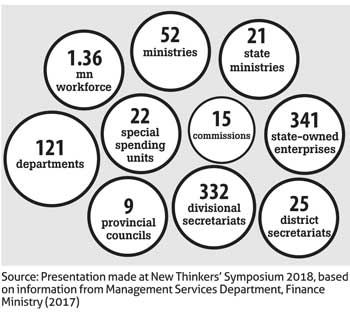Reply To:
Name - Reply Comment
 Economic reforms have become an urgent need for Sri Lanka, with successive governments since independence, resorting to short-term, politically expedient economic strategies that have placed considerable macroeconomic pressures whilst reducing Sri Lanka’s global competitiveness.
Economic reforms have become an urgent need for Sri Lanka, with successive governments since independence, resorting to short-term, politically expedient economic strategies that have placed considerable macroeconomic pressures whilst reducing Sri Lanka’s global competitiveness.
Vision 2025, the current government’s short and medium-term policy direction, is aimed at steering the economy towards more sustainable means of growth, led by foreign and domestic private investment.
The successful implementation of economic reforms, however, depends heavily on a combination of political, institutional and socio-economic factors. In fact, institutional misalignment, misidentified reforms and data deficiencies were identified as key structural and institutional bottlenecks hampering the successful implementation of Vision 2025, at the New Thinkers’ Symposium – a unique platform launched by the Institute of Policy Studies (IPS) for those under the age of 35, from the public and private sectors, academia, think-tanks and other fields of interest involved in economic affairs.
 Institutional misalignment
Institutional misalignment
The most severe impediment to national economic policy implementation is the complex institutional framework within Sri Lanka’s public sector, which lacks coordination and capacity and is worryingly bloated. The sector is made up of too many workers who are engaged in duplicative work while being subject to constant shifts in ministerial portfolios, a recipe for inaction of any national economic action plan.
‘Institutional excess’ in Sri Lanka’s public sector is giving rise to ‘institutional fragmentation’ and instability, which is ultimately the primary hindrance to implementation of any reform agenda. Policy ‘roadmaps’ such as Vision 2025 – which have undergone a consultative process to include inputs of relevant stakeholders – are likely to be futile in the absence of a stable institutional setup to implement the mapped out reforms.
A snapshot view of ‘institutional excess’ can be seen in the Figure. Too many ministries, agencies and departments, result in overlapping functions and mandates, which leads to institutional fragmentation.
Furthermore, the level of institutional instability in Sri Lanka can be illustrated with the case of the ‘Project Management Department and Monitoring Department’ (for Vision 2025), which experienced three changes in its overlooking ministry in the space of three years.
Another crucial area in need of reforms, hampered by institutional complexity, is the state-owned enterprises (SOE) sector. Multiple stakeholder contestations take place on SOE reforms due to the decentralization of SOE oversight, which slows and complicates the reform process.
Given that unstable and bloated public institutions are often a reality that developing economies must contend with, a more practical approach suggested would be to adopt ‘clusters’ of core subject areas that group together multiple ministerial portfolios belonging to the same core subject area. Under such a framework, clusters should coordinate closely to avoid duplicating mandates. The current ad hoc division of ministerial portfolios creates conflicts of interest whilst also hindering the scope of policy consistency and continuity.
Misidentified reforms
Economic reforms are often spread over a significant amount of time and require considerable sequencing. In this regard, it is vital that the government undertakes reforms that are most impactful on the economy, while taking into account ‘low hanging fruit’. For instance, when considering the impact of information communication technology (ICT) on the economy, policies to enable flexible working conditions facilitated by ICT and improved online payment mechanisms can have a much larger marginal benefit to the economy than the significant investment cost of providing free Wi-Fi to the public.
For instance, the Internet usage is low in Sri Lanka, amidst relatively affordable and higher Internet speeds, compared to other countries in the region. Similarly, on education reforms, low levels of tertiary enrolment in science, technology, engineering, mathematics (STEM) subjects has a knock on effect on the economy, with only 3.1 percent of the population above the age of 15 engaged in science and technology-related education and employment.
Given the current challenges regarding broad economic reforms, the government should concentrate on prioritizing policies that have wide public and bipartisan support, such as accommodating flexible office hours and less rigid working conditions.
Deficient data accessibility
Successful reform identification, proposal and implementation depend heavily on evidence-based policymaking. Therefore, deficiencies in data accessibility are a leading obstacle to good policy research in Sri Lanka and ultimately to its capacity to influence policy reform. This is a composite problem due to obscure governance structures and poor access to official data and information. The problem affects the research community and university students alike. Using facilities like the Right to Information (RTI) Act has led to some improvements. However, Verite Research finds that nearly 90 percent of 55 public authorities are ‘moderately unsatisfactory’ in their proactive disclosure of information and only 2 percent moderately satisfactory’ with regards to the same; this issue links back to poor public service delivery under a highly complex institutional setup, making accessing datasets time-consuming or impossible.
Conclusion
Unfortunately, Sri Lanka’s history of economic policy reforms has often been defined by its short-term nature, despite the necessity for long-lasting economic reforms heightening in recent years. Regardless of political affiliation, the country’s economic future will be determined by responsible policymaking over the next few years that address structural and institutional weaknesses.
While political will is important to successfully implement these reforms and the appetite for reforms has waned recently, there is significant scope for reforms with little to no political costs. Even these reforms, however, are likely to be undermined by bottlenecks discussed above, unless the government takes decisive steps to mitigate them.
(Kithmina Hewage is a Research Officer and Harini Weerasekera is a Research Assistant at the Institute of Policy Studies of Sri Lanka (IPS). This blog is based on the views expressed at the New Thinkers’ Symposium held at the IPS. For more articles, visit the IPS blog http://www.ips.lk/talkingeconomics/)